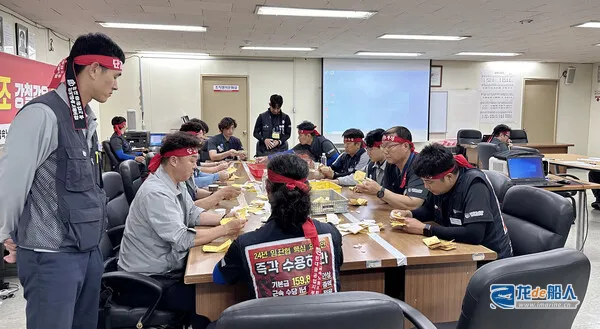The Korea Federation of Korean Metal Workers’ Trade Unions (KOSUN) announced on the 25th that it had received a total of 92.8% overwhelming approval in favor of the strike during the strike vote held from 22 to 24. The first general strike will be held on August 28th.

The Labor unions of Korea’s shipbuilders consists of eight shipyard chapters, including HD Hyundai Heavy Industries, Hanwha Ocean, HSG Seongdong Shipbuilding, K Shipbuilding, HD Hyundai Samho, HJ Heavy Industries, HD Hyundai Mipo, and Samsung Heavy Industries.
The 14,936 members of the remaining six unions, including HD Hyundai Heavy Industries, have participated in the voting, which is about 78.15% of the total number of members of the six unions (19,111). Of the 14,936 voting members, a total of 13,864 voted in favor of the strike, giving a strike support rate of 92.8% of those who participated in the vote. Even based on the 19,111 union members, about 72.5% support the strike.HD Hyundai Samho will hold a vote on whether to participate in the strike from 25 to 26; the HJ Heavy Industries branch, which is a minority union, does not have the right to vote.
In the case of HD Hyundai Heavy Industries, for example, the company’s labor union has passed a strike proposal on the 24th in connection with the negotiation of wages and collective agreements for 2024. Of the 7,560 union members, a total of 5,195 participated in the strike vote held from 22 to 24, representing 68.72% of the participants, of which 4,919 (65.1% of the total number of union members and 94.7% of the number of people who voted) supported the strike. This suggests that the HD Hyundai Heavy Industries labor union has the right to strike if labor and management suspend mediation due to excessive disagreement.
The HD Hyundai Heavy Industries labor union will reportedly discuss a strike timetable after the shipyard’s high-temperature holiday ends and plans to participate in a four-hour partial strike on August 24th. Until recently, HD Hyundai Heavy Industries labor and management had engaged in more than a dozen rounds of negotiations with little success.
Earlier, the HD Hyundai Heavy Industries labor union put forward a series of demands to the employer such as a 159,800 won increase in the basic wage, a change in the calculation criteria for performance bonuses, and an extension of the retirement age, but the employer has yet to put forward any concrete proposals. It is expected that in this year’s negotiations, labor and management will continue to negotiate on issues such as the rate of wage increase and the extension of the retirement age due to the booming shipbuilding industry.

It is worth mentioning that the Labor unions of Korea’s shipbuilders expressed its determination to break the deadlock in the labor-management negotiations by means of a joint fight as early as during its fifth conference of delegates held on July 13th and announced that it would hold its first general strike on August 28th.
The union stated, “The result of the overwhelming vote on whether or not to call a strike has shown the extent of the anger of the workers of the shipyard. The employers have not responded to the union’s demands for negotiations and are dragging their feet on the grounds that the company is in trouble. Meanwhile, the union continues to face issues such as human rights violations through the installation of facial recognition devices, unilateral outsourcing of workplaces, non-payment of wages to outsourced workers, and indiscriminate importation of foreign workers.” And it warned, “The union will do its best to negotiate an amicable agreement, but if the goodwill of the union members is ignored, the union will launch a strong fight, beginning with the first general strike on August 28.”
The common demands of the Labor unions of Korea’s shipbuilders’ include: a uniform increase of 159,800 won in the basic wage (excluding raises); hiring more regular employees than retirees; and the abolition of the wage peaking system and the extension of the retirement age, etc.
Although labor unions have fought for the right to strike, Korean industry analysts say that even if labor and employers hold a general strike due to a breakdown in negotiations, there will be no major business risks such as work stoppages. The reasons for this are the high proportion of outsourced employees in shipyards and the flexibility of shipyard processes.
The strike is unlikely to affect the shipyard’s business,” said a South Korean shipyard official. The best solution for both sides, is to find a consensus and achieve a win-win situation. According to the booming trend of the shipbuilding industry, the labor union wants to further improve the wage of the employees, but the employer believes that it will have to wait for some time. There is a difference of opinion between the two sides, and it usually takes at least two years from the signing of a shipbuilding contract to delivery of a new ship.”
The Labor unions of Korea’s shipbuilders also said, “The automobile industry, which entered the negotiation phase almost simultaneously with the shipbuilding industry, has received several solutions from the employers, and the differences between the two sides are narrowing. Shipyards are not afraid of the threat of a strike by labor unions due to the flawed employment structure of shipyards, which has more employees such as outsourced workers and peasant workers than regular employees.”


